Chocolate addiction signs, symptoms, and treatments
Table of content
Chocolate addiction is an uncontrolled consumption of large amounts of chocolate despite adverse health consequences. A negative relationship with chocolate manifests itself through psychological and behavioral difficulties.
The symptoms of chocolate addiction include intense cravings for chocolate, continuous consumption of chocolate past the point of fullness, and the inability to control chocolate intake despite health consequences.
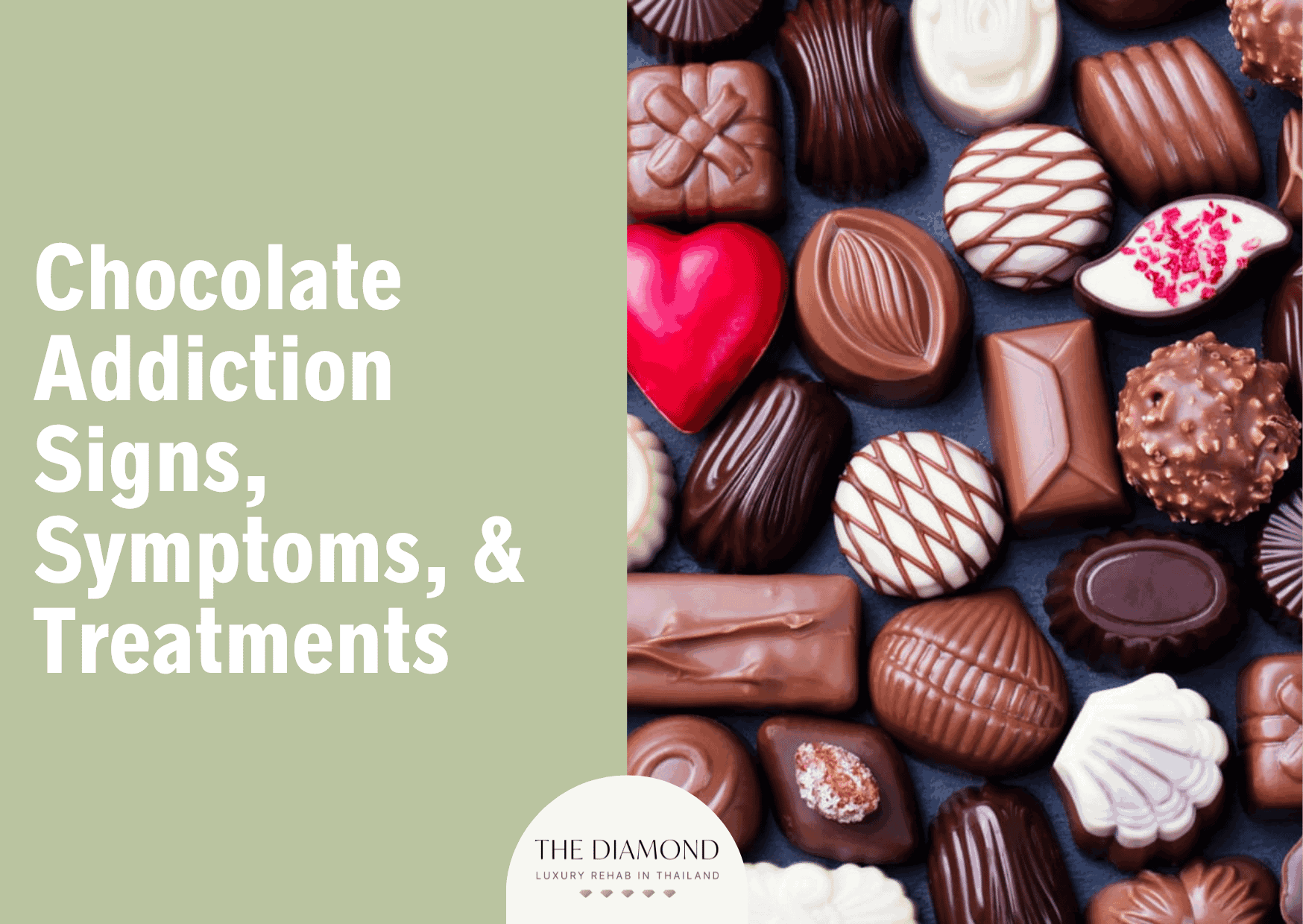
The causes of compulsive chocolate consumption can be linked to chocolate’s addictive properties, release of pleasure chemicals in the brain, and feelings of stress and anxiety.
The effects of chocolate addiction include eating disorders, obesity, feelings of guilt, self-loathing, depression, and anxiety.
What is chocolate addiction?
Chocolate addiction is the lack of control over chocolate consumption that is characterized by intense cravings for chocolate. In a study published in Appetite, Professor Marion Hetherington and Jennifer MacDiarmid of the Department of Psychology of the University of Dundee further added that a chocolate addict may continue eating the treat regularly despite being aware of the resulting health problems.
What are the causes of chocolate addiction?
The causes of chocolate addiction are listed below.
- Biological factors: A person’s preference for sweet foods can be due to genetics and the stimulation of the brain’s reward system caused by substances in chocolates. Evidence exists that children of parents with alcohol problems are more likely to develop a preference for sugary foods like chocolate. Addictive-like eating behavior around chocolate also stems from its ability to increase levels of neurotransmitters such as dopamine and serotonin, which are both critical for appetite and positive mood. Chocolate also contains various bioactive components, such as methylxanthines, biogenic amines, and cannabinoid-like fatty acids. These bioactive components may induce abnormal behaviors and psychological sensations similar to those experienced with other addictive substances, according to professors Kristen Bruinsma and Douglas Taren of the Arizona Prevention Center of the University of Arizona in an article published in the Journal of the Academy of Nutrition and Dietetics.
- Psychological factors: Negative emotions such as stress, anxiety, and depression can make people turn to chocolate for comfort and reassurance. Some people also tend to associate chocolate with comfort food, which is craved when in need of a mood boost. A study by Dallard et al. of the CHU de Saint-Etienne published in L’encephale found that psychologically vulnerable and depression- and anxiety-susceptible individuals seem to consume chocolate as a light psychotropic drug to alleviate psychological distress.
- Social factors: Chocolate is depicted in the media or advertisements as an indulgence or something one should be guilty about. This may influence increased consumption to the point of abuse, as people are exposed to images of chocolate and helpless chocoholics everywhere. According to a 2017 research article published in PLoS One by Julia M. Hormes and Martha A. Niemiec of the University of Albany in New York, internalized cultural norms may have a causal influence on chocolate craving and consumption. For instance, in a society that focuses on the constructs of beauty standards and physical attractiveness, chocolate consumption is highly discouraged because of its weight-inducing effect, weight-gain potential, or obesogenic properties.
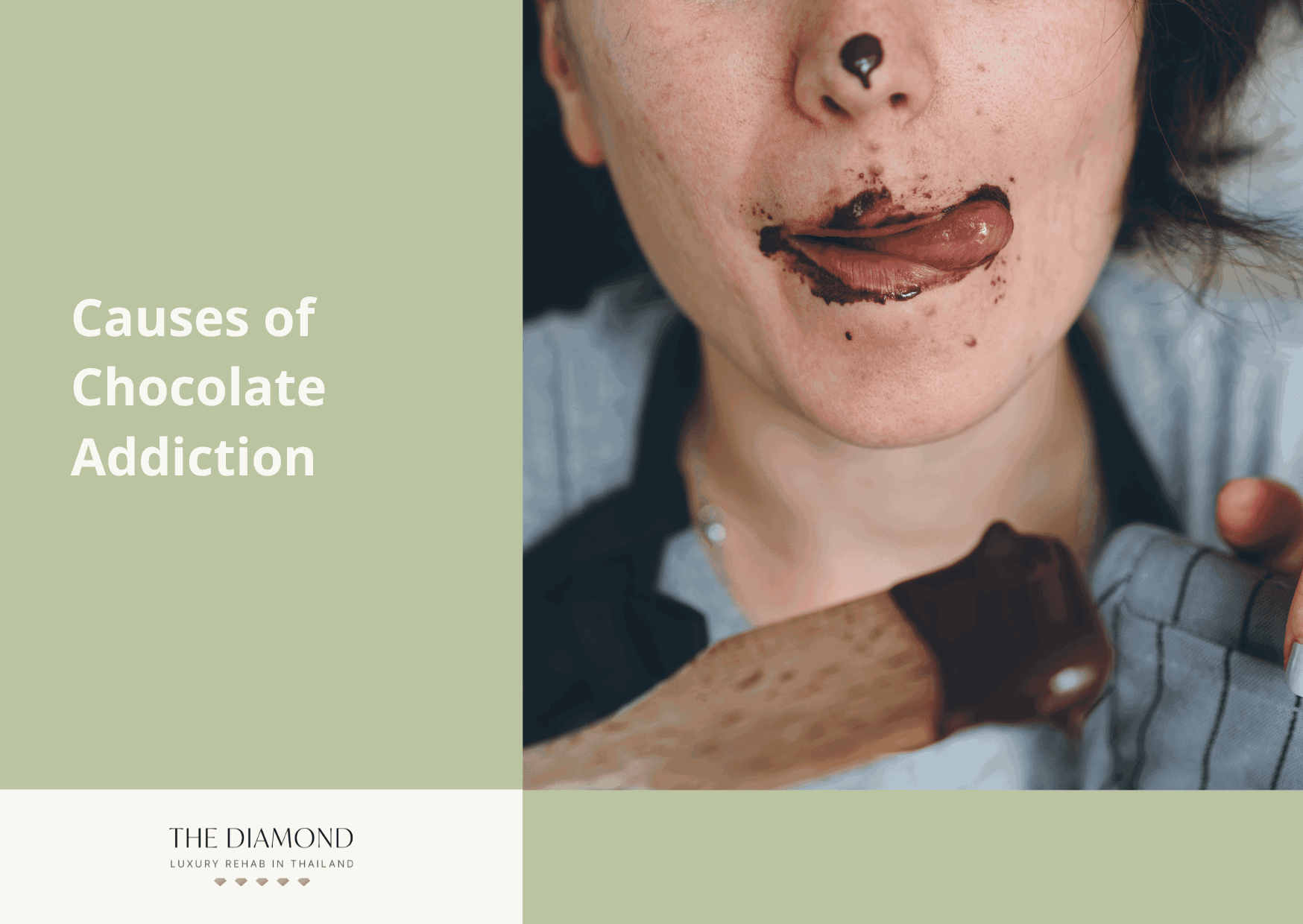
What are the effects of chocolate addiction?
The effects of chocolate addiction are listed below.
- Physical effects: Excessive consumption of chocolate can lead to physical issues, including weight gain, obesity, elevated blood sugar levels, and breakouts in acne-prone skin. In a systematic review published in BMJ in 2011, researchers led by Adriana Buitrago-Lopez of the Department of Public Health and Primary Care of the University of Cambridge emphasized that excessive chocolate consumption and the high sugar content of chocolates can induce weight gain, a risk factor for hypertension, dyslipidemia, diabetes, and cardiometabolic disorders. Research also suggests that consuming large amounts of refined sugars may worsen existing acne problems or cause new breakouts in the skin. According to a 2018 article published in The Journal of Clinical and Aesthetic Dermatology by a team of doctors in Cambridge, United Kingdom, dark chocolate consumption can contribute to the risk of acne development in young individuals by promoting bacterial colonization and hyper cornification on the surface of the facial skin.
- Psychological effects: Chocolates can affect people’s emotions in both positive and negative ways. Dana Small et al. of the Yale School of Medicine highlighted in a study published in Brain, a journal of neurology, that eating chocolate can have two separate effects on the brain’s limbic system. The psychological effects of chocolate consumption include elevated mood, feelings of euphoria, and addiction-like cravings. The release of serotonin and dopamine triggered by chocolate helps with mood regulation but can also cause a person to repeatedly eat chocolate to achieve pleasurable feelings. This implication of craving is also known to occur when people take cocaine. In contrast, different regions of the brain responsible for decision-making urge a person to stop eating when they consume more than they want to.
- Short-term effects: Eating too much chocolate has short-term effects such as a sudden boost in mood, nausea, headaches, and blood pressure spikes. Lei Jia et al. of the Peking Union Medical College in China further expanded in a 2010 journal article published in The American Journal of Clinical Nutrition that tyramine in chocolate is known as a common migraine trigger and also promotes a sudden increase in blood pressure, which can be accompanied by nausea and headaches.
- Long-term effects: Overconsumption of chocolate may lead to long-term health risks, including acid reflux, heartburn, fast heartbeat, and sleep problems. The cocoa in chocolate is acidic and may cause gastrointestinal issues, including acid reflux and heartburn. The caffeine content of cocoa may also result in side effects such as sleeplessness and a fast heartbeat.
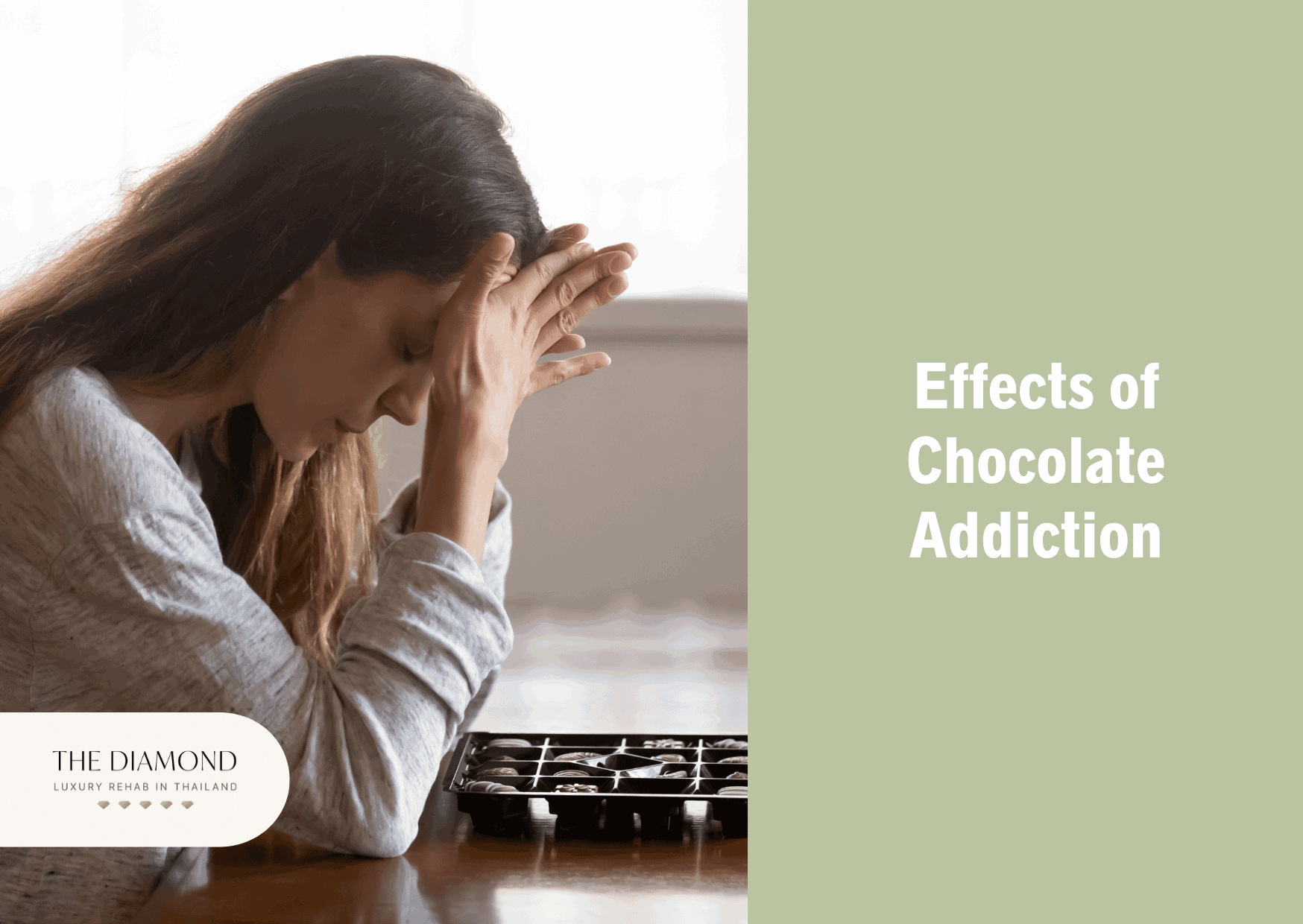
What are the signs and symptoms of chocolate addiction?
The signs and symptoms of chocolate addiction are listed below.
- Intense chocolate cravings: The high sugar and fat content of many chocolates can trigger addiction-like cravings. Chocolate is reported as the most commonly craved food. Eating chocolate has been found to activate regions of the brain that regulate cravings and rewards, which is the same pattern of brain activity seen in drug addiction. According to a 2019 study published in Nutrients by Rachel Adams et al. of Cardiff University, people are more likely to crave food or drugs when constantly exposed to cues or triggers that remind them of food or drugs. Periodic exposure to such cues intensifies cravings that may lead to a cycle of repeated cravings and consumption.
- Continuous consumption of chocolate past the point of fullness: Chocolate addicts often have no control over the amount of chocolate they consume. As a result, people addicted to chocolate may continue eating the food even after feeling full. In a 2021 review article published in the Frontiers in Psychiatry, clinical psychologist Octavian Vasiliu of the Dr. Carol Davila University Emergency Military Central Hospital in Romania explained that food addiction, similar to drug abuse, is believed to decrease D2 receptors density which is responsible in controlling the activity of dopamine neurons that help make and release dopamine in the brain. When individuals experience less pleasure from eating, they may overeat to satisfy this lack of gratification.
- Inability to control chocolate intake despite health consequences: Overconsumption of chocolate may contribute to weight gain, obesity, and other health problems. A chocolate addict may, however, ignore obvious health effects due to losing control over the object of addiction.
- Lying to friends and family about overconsumption of chocolate: Someone who is addicted to chocolate may keep their obsession a secret from family or friends to cover feelings of shame and protect their vulnerability.
- Feelings of guilt over eating chocolate: When one bar of chocolate quickly turns into the need to eat a whole box, one may experience feelings of guilt after eating the treat. However, a chocolate addict may repeat the behavior despite negative feelings, keeping the cycle of addiction going.
Other possible chocolate addiction symptoms include:
- Making excuses to have more chocolate
- Eating more chocolate than originally intended
- Having an uncontrollable urge to eat the treat despite feeling full
- Attempting to set rules around snacking chocolate but repeatedly failing
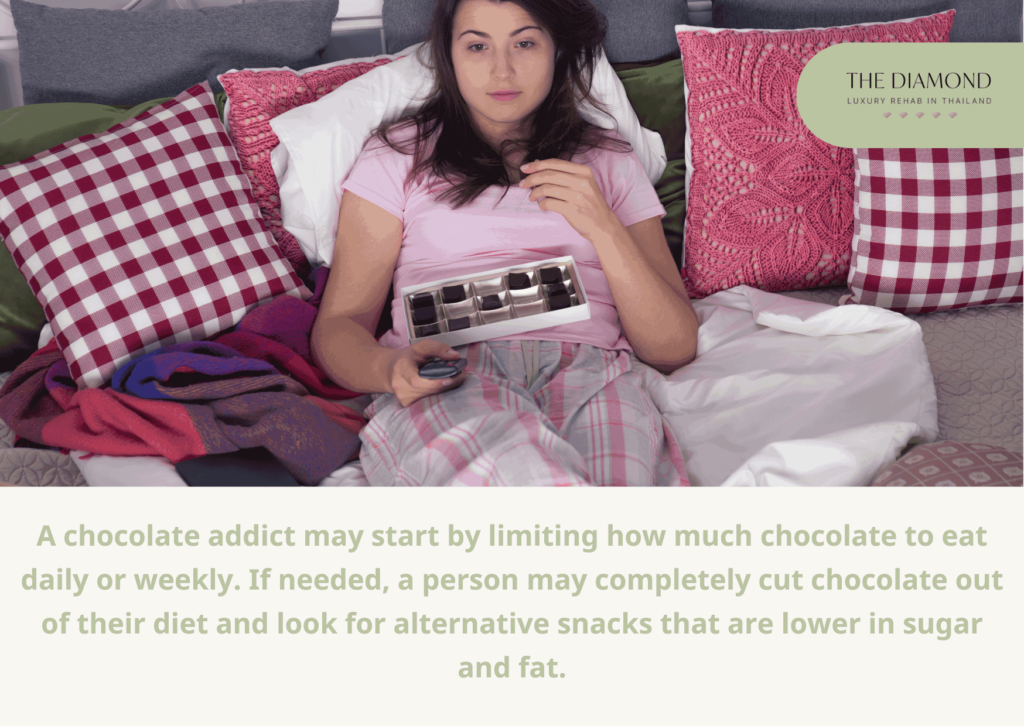
How to overcome chocolate addiction?
One can overcome food addiction by practicing mindful eating. The practice of mindful eating involves developing awareness around food and recognizing physical cues when eating.
A chocolate addict may start by limiting how much chocolate to eat daily or weekly. If needed, a person may completely cut chocolate out of their diet and look for alternative snacks that are lower in sugar and fat. In a 2019 study published in Nutrients, Rachel Adams and her team from Cardiff University emphasized that attention modification training can be a promising approach to addressing food addiction. This form of training may reduce food consumption by increasing the amount of eating healthy foods.
Another approach may also include modifying approach biases towards food that contribute to overconsumption when developed and evolved into maladaptive behaviors. Therefore, reducing or modifying these biases is an important element of interventions to promote healthier behavior. Through this, it is beneficial to listen to physical hunger cues and only eat until full. Gaining a deeper understanding of the root causes and triggers of one’s chocolate addiction is also a crucial step in overcoming an unhealthy relationship with chocolate consumption.
What are the risk factors for chocolate addiction?
The risk factors for chocolate addiction are listed below.
- Eating disorders: Chocolate craving has been associated with eating disorders. People who struggle with abnormal eating behaviors may be more likely to develop an addiction to chocolate.
- Obesity: Binge eating disorder, loss of control over eating, and food addiction are more common in obese people. As a result, people who suffer from obesity may also struggle with a form of disordered eating that can involve chocolate.
- Magnesium deficiency: Chocolate cravings may result from magnesium deficits. Some people may feel the need to consume chocolate to increase magnesium levels as chocolate is high in magnesium.
- Emotional eating: Evidence exists that chocolate has more potent effects on people who emotionally eat. Individuals who engage in emotional eating often associate chocolates with comfort and may feel guilt or shame after overconsumption of the food.
How do you treat chocolate addiction?
Chocolate addiction can be treated by talking to a mental healthcare professional about the problem. A therapist may help a chocolate addict better understand the underlying causes of their addiction and provide a plan to overcome the condition.
A counseling session is also beneficial in avoiding possible triggers of chocolate addiction by developing healthier coping mechanisms when faced with intense cravings. Treating chocolate addiction can also be done with the assistance of other medical professionals, such as physicians and nutritionists, who may help reverse the physical impacts of chocolate addiction on a person’s body.

Why is chocolate addictive?
Chocolate is addictive because it contains sugar and fat that trigger brain reward pathways. Generally, highly processed foods, including chocolates, are considered more addictive than foods with minimal processing.
Chocolate is a food product obtained from Theobroma cacao tree seeds. Aside from eating, chocolate may also be used for other purposes, including making cocktails, as a dipping sauce, and as a garnish for desserts.
Chocolate has several proven benefits. The advantages of a healthy relationship with chocolate include lowered risk of stroke, better heart health, a resilient immune system, and improved brain function.
In some cases, however, overconsumption of chocolate may lead to adverse consequences. The disadvantages of chocolate include obesity, acne, diabetes, high blood pressure, mood swings, acid reflux, heartburn, and the risk of addiction.
One of the many reasons why chocolate is addictive has something to do with its interaction with a brain chemical called enkephalin. Enkephalin is a naturally occurring brain chemical that activates opioid receptors, which are receptors that respond to opiates like morphine. In 2012, research led by Alexandra G DiFeliceantonio from the Department of Psychology at the University of Michigan tested the effects of enkephalin on rats. The study found that rats’ brains produced enkephalin when they consume chocolates. Meanwhile, rats ate more chocolate when they were given injections of enkephalin-like substances. This study suggests that chocolate consumption may increase the desire to eat more. Eating chocolate increases levels of enkephalin, resulting in the need to consume more chocolates.
Another reason behind chocolate’s addictive potential is a stimulating chemical called theobromine. Theobromine, when combined with caffeine, has positive effects on a person’s mood and also causes an aphrodisiac boost.
When is chocolate addiction counseling necessary?
Chocolate addiction counseling is necessary when an individual finds it difficult to stop or reduce chocolate consumption on their own and when struggling with the negative consequences of excessive chocolate consumption. Counseling provides support to patients and involves families in the recovery process. With the help of counseling, a person can identify and overcome chocolate-related problems as well as learn coping strategies that will help them resist chocolate cravings. This way, the addicted person gains a new perspective on the condition, leading to a healthier relationship with chocolate.
Educating family members through counseling is another crucial part of the recovery process. Family involvement in chocolate addiction treatment and recovery helps prevent relapse and address issues at home that may have contributed to the addiction.
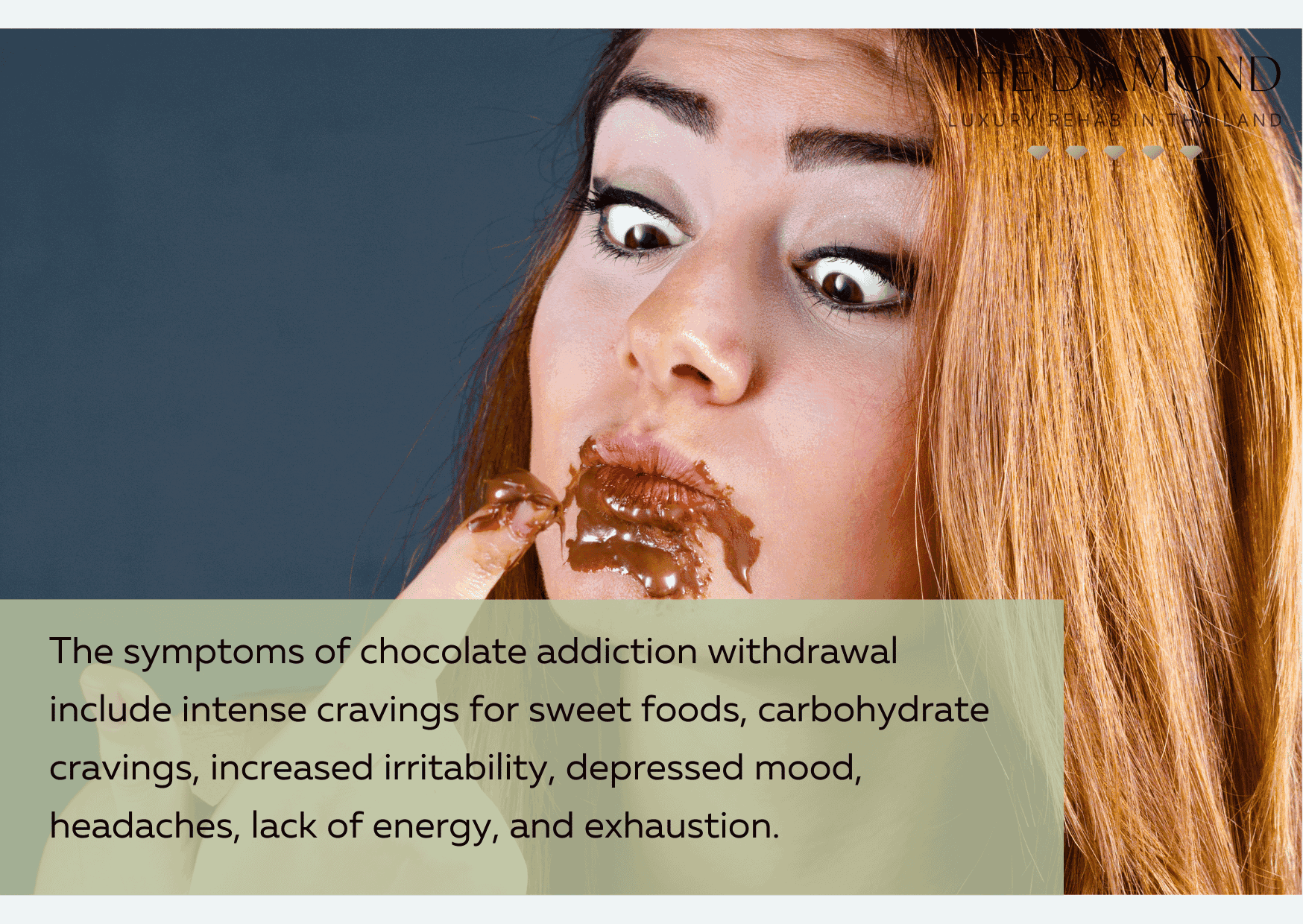
What are the symptoms of chocolate addiction withdrawal?
The symptoms of chocolate addiction withdrawal include intense cravings for sweet foods, carbohydrate cravings, increased irritability, depressed mood, headaches, lack of energy, and exhaustion.
Cutting back on chocolate may affect a person by causing withdrawal symptoms that may be uncomfortable. This happens as the body craves the release of pleasure chemicals in the brain once triggered by the overconsumption of chocolate.

